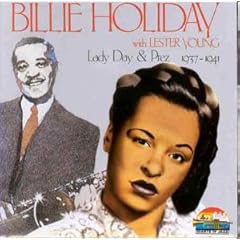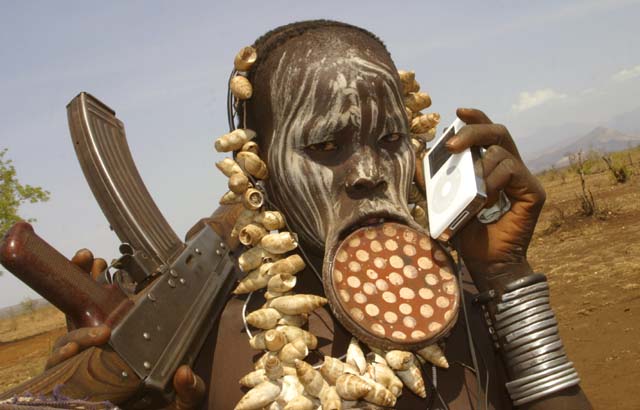Billie Holiday and Lester Young were a match made in the music writer's heaven: Lady Day, the embodiment of jazz, and The Prez, the best and the hippest of the shade-wearing, sax-toting, dope-smoking jazz cats. Their musical affinity, the tender platonic relationship, the fact that they gave each other nicknames, their brief, tragic, self-destructive lives inspired countless pages of purple proze. I quoted some of the more florid writing before: "like mating eagles, they rose higher and higher..." etc.
However, their alliance is interesting not only as a backdrop for a cliche'd romantic story, but for some very specific musical reasons. Lester Young is well-known as Charlie Parker's boyhood idol and the biggest influence on bop playing in general. The following style elements are usually listed: emphasis on the melodic rather than harmonic improvisation, fluid phrasing that goes across the bar, a loose rhythmic approach with a tendency to play behind the beat.
People who talk about his recordings with Holiday also say that their musical styles were especially close, and they list much the same elements as above. Apparently, Holiday and Young developed this approach independently, but once they started playing together, it really clicked.
Billie Holiday was never considered to be a bop forerunner or a bop singer proper, like Sarah Vaughan, Dinah Washington, or Anita O'Day - by the time bop started to take shape, she was already too invested into her extramusical/chemical pursuits to stay on the cutting edge - but at the time of these recordings she was definitely the first modernist among the jazz singers.
Second point: the music writer's fascination with the romantic couple unfortunately draws attention away from the other musicians that played on this. Sessions for a commercially and artistically successfull singer together with the best instrumentalist of the time are bound to draw a constellation of great accompanists, and they do: see the listing here (for recordings in chronological order) or here (track-by-track). Walter Page, Jo Jones, and Freddie Green are the celebrated Count Basie rhythm section, Claude Thornhill's future band became a veritable school for the cool jazz musicians, a former King Oliver/Louis Armstrong colleague Benny Morton is on clarinet, another sax is by Johnny Hodges, who really needs no introduction. As any great musician, Billie Holiday develops a special rapport with each one of them.
My favorite contributions, though, are by Buck Clayton: hear, for instance, his trumpet figures behind Billie on Easy Living. He is present on virtually every track. For bonus nerd points, Clayton is the single biggest contributor to the development of Chinese jazz/shidaiqu (wiki): he lived in Shanghai in 1934-1937, led a highly popular jazz band, and closely collaborated with Li Jinhui, the main architect of the shidaiqu sound.
But all the musical nerdery aside, these are some great pop songs from back when jazz was a good-time party music, before it got mired in the high-art pretensions. They are bouncy, catchy, groovy, melodic - and they are made by the greatest jazz singer and the greatest jazz instrumetalist of the time at the peak of their powers. Highly recommended!

Billie Holiday with Lester Young - Lady Day and Prez 1937-1941
256kbps, 125mb on megaupload
1. This Year's Kisses
2. Without Your Love
3. All Of Me
4. Me, Myself And I (Are All In Love With You)
5. I'll Get By
6. Mean To Me
7. A Sailboat In The Moonlight
8. I'll Never Be The Same
9. Getting Some Fun Out Of Life
10. The Man I Love
11. Trav'lin' All Alone
12. Time On My Hands
13. Laughing At Life
14. Back In Your Own Backyard
15. Georgia On My Mind
16. Let's Do It
17. Foolin' Myself
18. Easy Living
19. Say It With A Kiss
20. You Can't Be Mine (And Someone Else's Too)
21. I Can't Believe That You're In Love With Me
22. She's Funny That Way
23. Romance In The Dark
24. I Must Have That Man!
There are several compilations of this material out there. This one is a single-disc collection of choice picks from their legacy. There is also a double-disc Complete Billie Holiday and Lester Young at Taringa, although the bitrate is a little lower. There is also another "Complete recordings" collection on 3 CDs that includes a disc's worth of alternate takes etc., but I don't have that one.




